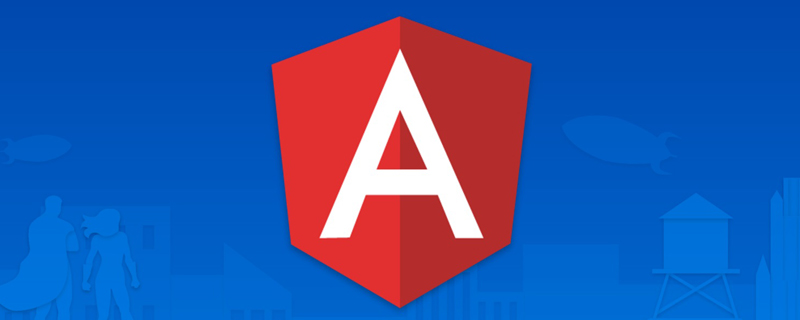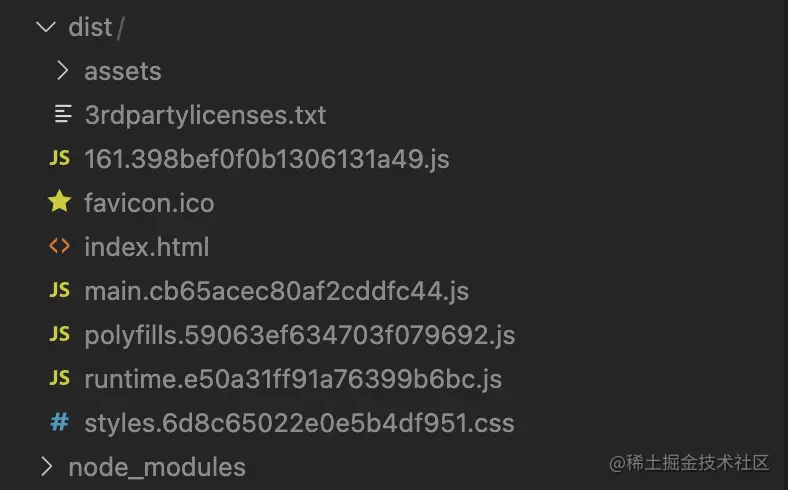 Web Front-end
Web Front-end
 JS Tutorial
JS Tutorial
 How to launch an Angular project? Let's talk about the online process with nginx!
How to launch an Angular project? Let's talk about the online process with nginx!
How to launch an Angular project? Let's talk about the online process with nginx!
AngularHow to launch the project? The following article will talk about the launch process of Angular project in combination with nginx. I hope it will be helpful to everyone!

After we complete the angular project, how should you go online? [Related tutorial recommendations: "angular tutorial"]
Maybe you will answer:
It is not my bussiness. Right?
Indeed, as a pure front-end developer, after completing the development of the project, you do not need to touch the next online content.
However, as a developer, it is very important for us to understand the process of the project from development to launch.
Let’s explain it in combination with nginx.
Same for react and vue
Packaging project
What is used here is angular-cli generated project. After developing the project, you only need to run npm run build. builder will output according to the packaging content you preset in angular.json.

- outputPath: The packaged storage folder path
- index: Mount the template file
- main: The project's After the main entry file
- ...
is completed, you can view the packaged file through outputPath.

Install Nginx
We install it on the machine where we want to deploy the code, that is, the serverNginx. The operation is based on the yum source operation of centos.
# 安装nginx yum -y install nginx # 查看版本 nginx -v # 启动nginx systemctl start nginx.service # 访问 默认是80端口 your_ip:80
Configure Nginx
View the configuration file nginx.conf of Nginx.
Use
whereis nginxto findnginxThe installation location
is in /etc/nginx/conf. Add a new configuration file to the d folder, such as demo.conf, and configure the server's interface address and front-end entry file path:
upstream api {
server 127.0.0.1:8888; // 服务端
keepalive 2000;
}
server {
listen [::]:80 default_server;
server_name _;
root /usr/share/nginx/demo-frontend/dist/demo-web; // 前端资源位置
location / {
add_header Access-Control-Allow-Origin *;
}
location /api { // api 处理
proxy_pass http://api;
}
}
# Settings for a TLS enabled server.
# server {
# listen 443 ssl http2 default_server;
# listen [::]:443 ssl http2 default_server;
# server_name _;
# root /usr/share/nginx/frontend/demo.com/dist;
# ssl_certificate "/root/ssh/nginx/1_demo.com_bundle.crt";
# ssl_certificate_key "/root/ssh/nginx/2_demo.com.key";
# ssl_session_cache shared:SSL:1m;
# ssl_session_timeout 10m;
# ssl_ciphers HIGH:!aNULL:!MD5;
# ssl_prefer_server_ciphers on;
# # Load configuration files for the default server block.
# include /etc/nginx/default.d/*.conf;
#
# location / {
#. add_header Access-Control-Allow-Origin *;
# }
# to api restful service
# location /api {
# proxy_pass http://api;
# }
# error_page 404 /404.html;
# location = /404.html {
# }
# error_page 500 502 503 504 /50x.html;
# location = /50x.html {
# }
# }Code comments Part of TLS is the transport encryption protocol
https, and the corresponding certificate needs to be added.
In the above code, we store the front-end static resources under /usr/share/nginx/frontend/demo.com/dist/, then we will package Just upload the content under dist/** to this directory file.
/usr/share/nginx/frontend/demo.com/dist/ actually points to the index.html entry file.
A relatively simple upload solution is to execute it directly on the user's local machine: rsync -avzh server username@62.**1.**.**:/usr/share /nginx/frontend/demo.com/dist/ index.html and its similar contents under the /dist project. Synchronize the packaged content to the corresponding location of the remote server. Then restart nginx, that is, nginx -s reload and you’re done.
Summary
Let’s summarize the whole process:
angular project packaging
Server installation nginx
nginx processing for back-end services
nginx handles front-end content
Upload the angular packaging file to the specified location on the server
Of course, you must apply for relevant information in advance The domain name, registration, related certificates, etc.
The idea is that simple. Of course, professional work should be left to operation and maintenance colleagues, don’t be too busy~
Original address: https://juejin.cn/post/7087417501486678030
Author: Jimmy
For more programming-related knowledge, please visit: Programming Teaching! !
The above is the detailed content of How to launch an Angular project? Let's talk about the online process with nginx!. For more information, please follow other related articles on the PHP Chinese website!

Hot AI Tools

Undresser.AI Undress
AI-powered app for creating realistic nude photos

AI Clothes Remover
Online AI tool for removing clothes from photos.

Undress AI Tool
Undress images for free

Clothoff.io
AI clothes remover

Video Face Swap
Swap faces in any video effortlessly with our completely free AI face swap tool!

Hot Article

Hot Tools

Notepad++7.3.1
Easy-to-use and free code editor

SublimeText3 Chinese version
Chinese version, very easy to use

Zend Studio 13.0.1
Powerful PHP integrated development environment

Dreamweaver CS6
Visual web development tools

SublimeText3 Mac version
God-level code editing software (SublimeText3)

Hot Topics
 1386
1386
 52
52
 Detailed explanation of angular learning state manager NgRx
May 25, 2022 am 11:01 AM
Detailed explanation of angular learning state manager NgRx
May 25, 2022 am 11:01 AM
This article will give you an in-depth understanding of Angular's state manager NgRx and introduce how to use NgRx. I hope it will be helpful to you!
 Angular learning talks about standalone components (Standalone Component)
Dec 19, 2022 pm 07:24 PM
Angular learning talks about standalone components (Standalone Component)
Dec 19, 2022 pm 07:24 PM
This article will take you to continue learning angular and briefly understand the standalone component (Standalone Component) in Angular. I hope it will be helpful to you!
 How to install Angular on Ubuntu 24.04
Mar 23, 2024 pm 12:20 PM
How to install Angular on Ubuntu 24.04
Mar 23, 2024 pm 12:20 PM
Angular.js is a freely accessible JavaScript platform for creating dynamic applications. It allows you to express various aspects of your application quickly and clearly by extending the syntax of HTML as a template language. Angular.js provides a range of tools to help you write, update and test your code. Additionally, it provides many features such as routing and form management. This guide will discuss how to install Angular on Ubuntu24. First, you need to install Node.js. Node.js is a JavaScript running environment based on the ChromeV8 engine that allows you to run JavaScript code on the server side. To be in Ub
 An article exploring server-side rendering (SSR) in Angular
Dec 27, 2022 pm 07:24 PM
An article exploring server-side rendering (SSR) in Angular
Dec 27, 2022 pm 07:24 PM
Do you know Angular Universal? It can help the website provide better SEO support!
 How to use PHP and Angular for front-end development
May 11, 2023 pm 04:04 PM
How to use PHP and Angular for front-end development
May 11, 2023 pm 04:04 PM
With the rapid development of the Internet, front-end development technology is also constantly improving and iterating. PHP and Angular are two technologies widely used in front-end development. PHP is a server-side scripting language that can handle tasks such as processing forms, generating dynamic pages, and managing access permissions. Angular is a JavaScript framework that can be used to develop single-page applications and build componentized web applications. This article will introduce how to use PHP and Angular for front-end development, and how to combine them
 Angular + NG-ZORRO quickly develop a backend system
Apr 21, 2022 am 10:45 AM
Angular + NG-ZORRO quickly develop a backend system
Apr 21, 2022 am 10:45 AM
This article will share with you an Angular practical experience and learn how to quickly develop a backend system using angualr combined with ng-zorro. I hope it will be helpful to everyone!
 A brief analysis of how to use monaco-editor in angular
Oct 17, 2022 pm 08:04 PM
A brief analysis of how to use monaco-editor in angular
Oct 17, 2022 pm 08:04 PM
How to use monaco-editor in angular? The following article records the use of monaco-editor in angular that was used in a recent business. I hope it will be helpful to everyone!
 A brief analysis of independent components in Angular and see how to use them
Jun 23, 2022 pm 03:49 PM
A brief analysis of independent components in Angular and see how to use them
Jun 23, 2022 pm 03:49 PM
This article will take you through the independent components in Angular, how to create an independent component in Angular, and how to import existing modules into the independent component. I hope it will be helpful to you!




